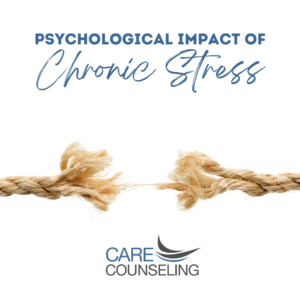Unraveling the Long-Term Effects of Chronic Stress
 Chronic stress has become increasingly prevalent in our fast-paced and demanding world, and its impact on our well-being cannot be ignored. Prolonged exposure to stress can have profound effects on both our mental and physical health. In this blog post, we will delve into the intricate web of the psychological impact of chronic stress. We will explore its long-term effects, coping mechanisms for managing stress, and strategies to foster resilience and well-being.
Chronic stress has become increasingly prevalent in our fast-paced and demanding world, and its impact on our well-being cannot be ignored. Prolonged exposure to stress can have profound effects on both our mental and physical health. In this blog post, we will delve into the intricate web of the psychological impact of chronic stress. We will explore its long-term effects, coping mechanisms for managing stress, and strategies to foster resilience and well-being.
Understanding the Long-Term Effects:
Chronic stress, the prolonged and ongoing state of stress, can take a toll on our mental and physical health. Over time, it can lead to a variety of long-term effects:
- Mental Health: Chronic stress is associated with an increased risk of developing mental health disorders, such as anxiety and depression. It can also exacerbate existing conditions, impair cognitive function, and impact overall psychological well-being.
- Physical Health: The impact of chronic stress extends beyond mental health. It can contribute to the development or worsening of various physical health conditions, including cardiovascular disease, gastrointestinal issues, weakened immune function, and chronic pain.
Coping Mechanisms for Managing Chronic Stress:
While chronic stress is a pervasive challenge, there are coping mechanisms and stress management strategies that can help mitigate its effects:
- Self-Care: Prioritizing self-care is essential for managing chronic stress. Engaging in activities that promote relaxation, such as exercise, mindfulness, and hobbies, can provide much-needed relief and restore balance.
- Social Support: Seeking support from loved ones, friends, or support groups can help alleviate the burden of chronic stress. Sharing experiences, receiving validation, and obtaining practical advice can foster resilience and a sense of connectedness.
- Healthy Lifestyle Habits: Nurturing a healthy lifestyle can significantly impact our ability to manage chronic stress. This includes getting adequate sleep, maintaining a balanced diet, and limiting substances like alcohol and caffeine.
- Stress Reduction Techniques: Employing stress reduction techniques, such as deep breathing exercises, progressive muscle relaxation, and meditation, can promote relaxation and help regulate the body’s stress response.
Fostering Resilience and Well-being
To navigate the long-term effects of chronic stress, fostering resilience and well-being is crucial. Here are some strategies to consider:
- Building Resilience: Resilience is the ability to bounce back and adapt in the face of adversity. Cultivating resilience involves developing problem-solving skills, nurturing a positive mindset, fostering social connections, and seeking professional support when needed.
- Prioritizing Boundaries: Setting clear boundaries between work and personal life can help prevent chronic stress from permeating all aspects of our existence. Establishing routines, allocating time for rest and rejuvenation, and learning to say no to excessive demands are essential practices.
- Seeking Professional Help: If chronic stress becomes overwhelming or begins to significantly impact daily functioning, seeking help from a mental health professional is crucial. Therapists can provide guidance, support, and evidence-based interventions tailored to individual needs.
Chronic stress is a pervasive challenge today, with far-reaching implications for our mental and physical well-being. Understanding its long-term effects is the first step toward effective management. By employing coping mechanisms, stress reduction techniques, and prioritizing self-care, we can alleviate the burden of chronic stress and nurture our resilience and well-being. Remember, reaching out for support and seeking professional help when needed are signs of strength. By embracing these strategies, we can navigate the complexities of chronic stress, restore balance, and cultivate a life filled with resilience, health, and flourishing well-being.



























